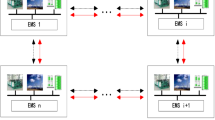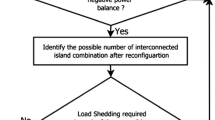Abstract
A microgrid (MG) comprises a low-voltage network with several microsources, critical and noncritical loads, and energy storage systems (ESSs). It can operate in the grid-connected or islanded modes. In islanded mode, the voltage and frequency of the MG should be controlled by different distributed energy resources (DERs). This paper focuses on the analysis of frequency stability in an autonomous MG with renewable energy sources. In this paper, colonial competitive algorithms are used to design the DERs controllers in a cooperative manner that these controllers can keep the MG stable. Artificial neural network tool trained by Levenberg–Marquardt algorithm is used to generate controlling signal for every controller to keep the frequency and voltage in a desired range. This paper investigates a new optimal control solution for maintaining the frequency stability in the MG, by using a combination of an ESS and load-shedding procedure. The cooperative game theory is used in this paper to model the interaction among different DERs, ESSs, and loads.






Similar content being viewed by others
References
Senjyu T, Nakaji T, Uezato K, Funabashi T (2005) A hybrid power system using alternative energy facilities in isolated island. IEEE Trans Energy Convers 20(2):406–414
Sanjari MJ, Gharehpetian GB (2013) Small signal stability based fuzzy potential function proposal for secondary frequency and voltage control of islanded microgrid. Electric Power Compon Syst 41(5):485–499
Sanjari MJ, Gharehpetian GB (2013) Unified framework for frequency and voltage control of autonomous microgrids. IET Gener Transm Distrib 7(9):965–972
Sanjari MJ, Gharehpetian GB (2013) Incomplete information based decentralized cooperative control strategy for distributed energy resources of VSI-based microgrids. Neural Comput Appl. doi:10.1007/s00521-013-1473-0
Xiong X, Ouyang J (2011) Modeling and transient behavior analysis of an inverter-based microgrid. Electric Power Compon Syst 40(1):112–130
Venkataramanan G, Illindala M (2002) Microgrids and sensitive loads. In: Proceedings of the IEEE power eng. soc. winter meeting, 2002
Lopes JAP, Moreira CL, Madureira AG (2006) Defining control strategies for microgrids islanded operation. IEEE Trans Power Syst 21(2):916–924
Piagi P (2005) Microgrid control. Ph.D. thesis, Electrical Engineering Department, University of Wisconsin-Madison
Sebastian R, Quesada J (2006) Distributed control system for frequency control in a isolated wind system. Renew Energy 31(3):285–305
Serban CM (2008) A new control method for power quality improvement in island microgrids. In: Proceedings of the IEEE international symposium on industrial electronics (ISIE 2008), 30 June–2 July, Cambridge, UK, pp 2258–2263
Serban I, Marinescu C (2008) A solution for frequency control in islanded three-phase micro-grids supplied by renewable energy sources. In: Proceedings of the 11th international conference on optimization of electrical and electronic equipment (OPTIM ‘08), Brasov, Romania, May 2008, pp 327–332
Serban I, Marinescu C (2008) Power quality issues in a stand-alone microgrid based on renewable energy. Rev Roum Sci Techn Électrotechn Énerg 53(3):285–293
Singh BK, Chandra G, Kamal-Al-Haddad A (2007) Battery based voltage and frequency controller for parallel operated isolated asynchronous generators. In: IEEE international symposium on industrial electronics (ISIE-2007), Vigo, 4–7 June 2007, pp 883–888
Lasseter R, Piagi P (2000) Providing premium power through distributed resources. In: Proceedings of the 33rd Hawaii international conference in system science, vol 4
Chandorkar MC, Divan DM, Adapa R (1993) Control of parallel connected inverters in standalone AC supply systems. IEEE Trans Ind Appl 29(1):136–143
Moreira CL, Peças Lopes JA (2007) Microgrids dynamic security assessment. IEEE
Papathanassiou S, Hatziargyriou ND, Strunz K (2005) A benchmark low voltage microgrid network. In: CIGRE symposium in “power systems with dispersed generation”
Lasseter R (2002) Microgrids. In: IEEE PES winter meeting, 27–31 January 2002, vol 1, pp 305–308
Hebner R, Beno J, Walls A (2002) Flywheel batteries come around again. IEEE Spectr 39(34):46–51
Cimuca GO, Saudemont C, Robyns B, Radulescu MM (2006) Control and performance evaluation of a flywheel energy-storage system associated to a variable-speed wind generator. IEEE Trans Ind Electron 53(4):1074–1085
Zhu Y, Tomsovic K (2002) Development if models for analyzing load following performance of micro turbines and fuel cells. Electric Power Syst Res 62:1–11
Padulles J, Ault GW, McDonald JR (2000) An integrated SOFC plant dynamic model for power systems simulation. J Power Sources 86:495–500
Pasricha S, Shaw SR (2006) A dynamic PEM fuel cell model. IEEE Trans Energy Convers 21(2):484–490
King DL (1996) Photovoltaic module and array performance characterization methods for all system operating conditions. NREL/SNL program review. AIP Press, Lakewood, pp 347–368
Pogaku N, Prodanovic M, Green TC (2007) Modeling, analysis and testing of autonomous operation of an inverter-based microgrid. IEEE Trans Power Electron 22(2):613–625
Katiraei F, Iravani MR, Lehn PW (2007) Small-signal dynamic model of a micro-grid including conventional and electronically interfaced distributed resources. IET Gener Transm Distrib 1(3):369–378
Tinney WF, Hart CE (1967) Power flow solution by Newton’s method. IEEE Trans Power Appar Syst PAS-86(11):1449–1460
Weaver W, Krein P (2009) Game-theoretic control of small-scale power systems. IEEE Trans Power Deliv 24(3):1560–1567
Semsar-Kazerooni E, Khorasani K (2008) Optimal consensus algorithms for cooperative team of agents subject to partial information. Automatica 44(11):2766–2777
Semsar-Kazerooni E, Khorasani K (2009) Multi-agent team cooperation: a game theory approach. Automatica 45(10):2205–2213
Engwerda JC (2005) LQ dynamic optimization and differential games. Wiley, New York
Azar AT (2012) Fast neural network learning algorithms for medical applications. Neural Comput Appl. doi:10.1007/s00521-012-1026-y
Sanjari MJ, Alizadeh Mousavi O, Gharehpetian GB (2013) Assessing the risk of blackout in the power system including HVDC and FACTS devices. Int Trans Electr Energy Syst 23(1):109–121
Author information
Authors and Affiliations
Corresponding author
Rights and permissions
About this article
Cite this article
Sanjari, M.J., Gharehpetian, G.B. Game-theoretic approach to cooperative control of distributed energy resources in islanded microgrid considering voltage and frequency stability. Neural Comput & Applic 25, 343–351 (2014). https://doi.org/10.1007/s00521-013-1497-5
Received:
Accepted:
Published:
Issue Date:
DOI: https://doi.org/10.1007/s00521-013-1497-5




